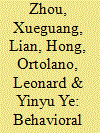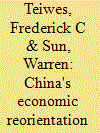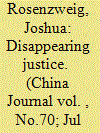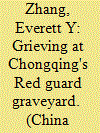|
|
|
Sort Order |
|
|
|
Items / Page
|
|
|
|
|
|
|
| Srl | Item |
| 1 |
ID:
122318


|
|
|
|
|
| Publication |
2013.
|
| Summary/Abstract |
How do we characterize and explain the behavioral patterns of the Chinese bureaucracy amid China's great transformation over the past three decades? The prevailing "tournament competition" model presented in the literature emphasizes the role of incentive design to explain bureaucratic behaviors. We develop an alternative model of "muddling through"-characterized by a reactive response to multiple pressures, constant readjustments and a focus on short-term gains-to explain the behavioral patterns of China's intermediate government agencies. We explain the underlying multiple bureaucratic logics that induce these behavioral patterns and the institutional conditions under which such behavioral patterns prevail. We illustrate the research issues, analytical concepts and theoretical arguments, using a case study of a municipal environmental protection bureau implementing the Five-Year Plan, between 2006 and 2010.
|
|
|
|
|
|
|
|
|
|
|
|
|
|
|
|
| 2 |
ID:
122320


|
|
|
|
|
| Publication |
2013.
|
| Summary/Abstract |
Although the broad outlines of the conflicting views and interests concerning economic readjustment following the December 1978 Third Plenum are adequately understood in the existing literature, academic accounts and the official narrative seriously misunderstand or misrepresent the élite politics surrounding the readjustment program in 1979-80. The view that Deng Xiaoping and Chen Yun joined forces in an alliance against Hua Guofeng has merit, but not, as commonly claimed, as a rejection of Hua's failed economic policies-Deng in fact was the most forceful advocate of the pre-plenum policies which Chen found most detrimental. The second widely accepted proposition, that Deng and Chen subsequently fell out along reform vs. readjustment lines, with Chen gaining the upper hand by late 1980, also distorts political reality. When readjustment finally achieved its most forceful manifestation, the actual policies were formulated by Zhao Ziyang, with Deng's crucial backing.
|
|
|
|
|
|
|
|
|
|
|
|
|
|
|
|
| 3 |
ID:
122316


|
|
|
|
|
| Publication |
2013.
|
| Summary/Abstract |
The 2011-12 revision of China's Criminal Procedure Law marked the first changes to the country's "mini-constitution" in 15 years, and the first time that proposed revisions were presented for public consultation. During the consultation period, lawyers, journalists and members of China's online communities criticized the draft's inadequacies, particularly measures that would allow investigators to "disappear" certain suspects. The debate over "secret arrest" revealed an emerging public discourse about justice issues, featuring an increasingly sophisticated understanding of the relationship between law and government accountability. Concern over police abuses is reorienting public opinion toward a justice discourse rooted in rights-protective procedures and institutions, that departs significantly from the rationales for criminal procedure reform articulated by China's politicolegal authorities. So long as those authorities treat legislative reform as a "contest" between institutional stakeholders and fail to engage with the public discourse, mistrust of public authority and demands for justice are likely to grow.
|
|
|
|
|
|
|
|
|
|
|
|
|
|
|
|
| 4 |
ID:
122317


|
|
|
|
|
| Publication |
2013.
|
| Summary/Abstract |
Ensuring the accountability of state agents requires the use of reward and sanction. Like other authoritarian regimes, the Chinese Party-state faces a dilemma in dealing with malfeasant agents: unprincipled tolerance undermines the regime's legitimacy, but disciplining officials may demoralize agents and result in the loss of state investment in them. Given this dilemma, selective or differentiated discipline becomes a logical choice. Using the case of social conflict management by local officials, this article explores the political rationale behind the use of selective discipline in China. It finds that two factors significantly affect the likelihood of an official being punished for mishandling social conflict: the severity of the consequences of the official's failure, and his or her role in the failure.
|
|
|
|
|
|
|
|
|
|
|
|
|
|
|
|
| 5 |
ID:
122313


|
|
|
|
|
| Publication |
2013.
|
| Summary/Abstract |
This article presents a historical and ethnographic account of the event of mourning at the Graveyard for the Red Guards in Chongqing. Built in the Cultural Revolution to glorify about 450 Red Guards as "revolutionary martyrs", this graveyard testifies to the tragic nature of their deaths, which resulted from fighting between two factions for their shared goal of "defending Chairman Mao". The post-Mao reform negated the Cultural Revolution. In a way, their deaths and mourning their deaths were stigmatized, resulting in their "second death", but recent important changes in Chinese society have allowed the resurgence of grieving for them, culminating in the granting of the official title of "cultural relic" to the graveyard. Opening up a space to contest their stigmatization and to invalidate the official judgement about the Cultural Revolution, this title signifies the rising imperative to account for every death in the name of life itself.
|
|
|
|
|
|
|
|
|
|
|
|
|
|
|
|
| 6 |
ID:
122312


|
|
|
|
|
| Publication |
2013.
|
| Summary/Abstract |
The Rectification Campaign of 1957 prompted a vibrant debate about Chinese socialism. This debate contained three analytically distinct perspectives on the intellectual, each corresponding to a specific vision of socialist development. The "legislator" perspective, championed by college students, demanded for intellectuals the right to help to define socialism. Leading intellectuals sponsored the "reformer" view, which argued that intellectuals were vital to improving governance under the Chinese Communist Party. The state's "red-and-expert" ideal demanded intellectuals' devotion to the working class and the acceleration of professional training for members of the working class. These perspectives promoted, respectively, a modernist, a traditionalist and a borderline Gramscian path of development-none of which was embraced by the Mao regime or post-Mao leaderships. Recovering these visions enriches our understanding of Chinese socialism; they offer powerful contrasts to extremes of both a subsequent Maoism and the current widening inequalities, official corruption and abuses.
|
|
|
|
|
|
|
|
|
|
|
|
|
|
|
|
| 7 |
ID:
122319


|
|
|
|
|
| Publication |
2013.
|
| Summary/Abstract |
This article analyzes mobility from the coastal region to the city of Lijiang, Yunnan. It presents the idea of home as an entry point to illuminate how a complex matrix of political-economic power can structure the use and interpretation of built heritage. First, the article explains why outside business people move to Lijiang. Second, it sketches out the conditions of mobility to Lijiang and explains the tensions between locals and outsiders. This research explores how the practices of outside businesspeople provoke and shape the politics of built heritage in Lijiang, and links these practices to the broader agendas of heritage ownership, local-outsider tensions and China's ongoing socioeconomic transition.
|
|
|
|
|
|
|
|
|
|
|
|
|
|
|
|
| 8 |
ID:
122315


|
|
|
|
|
| Publication |
2013.
|
| Summary/Abstract |
Faith-based charities are among the hundreds of thousands of non-profit, non-state organizations that have emerged in China in recent decades. The social service activities of these groups can rightly be seen as supporting the regime's policies and long-term goals. Yet faith-based organizations (FBOs) also enable religious adherents to resist aspects of China's authoritarian system, albeit in subtle and nonconfrontational ways. They do so by expanding the spaces and forms of religious practice beyond the limits imposed by the state, through organizational forms which the state itself has created and approved: the non-profit, non-enterprise unit and the charitable foundation. In transforming the organizations, spaces and behaviors of charity into vehicles of spiritual practice, FBOs "repurpose" the state for religious ends. The repurposing practiced by Chinese religious charities constitutes a distinct mode of subtle, non-contentious resistance.
|
|
|
|
|
|
|
|
|
|
|
|
|
|
|
|
|
|
|
|
|